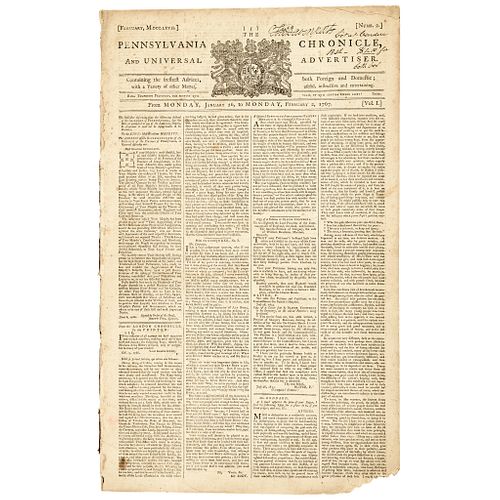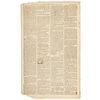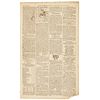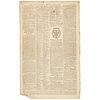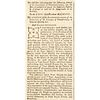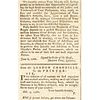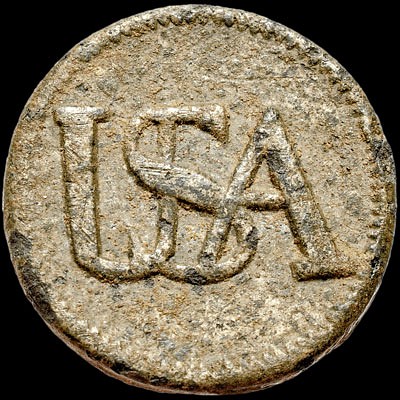1767 Pennsylvania Newspaper with Report on the Repeal of the Stamp Act
Lot 40
Estimate:
$1,800 - $2,400
Absentee vs Live bid
Two ways to bid:
- Leave a max absentee bid and the platform will bid on your behalf up to your maximum bid during the live auction.
- Bid live during the auction and your bids will be submitted real-time to the auctioneer.
Bid Increments
| Price | Bid Increment |
|---|---|
| $0 | $10 |
| $200 | $20 |
| $300 | $25 |
| $500 | $50 |
| $1,000 | $100 |
| $2,000 | $200 |
| $3,000 | $250 |
| $5,000 | $500 |
| $10,000 | $1,000 |
| $20,000 | $2,000 |
| $30,000 | $2,500 |
| $50,000 | $5,000 |
| $100,000 | $10,000 |
| $200,000 | $20,000 |
| $300,000 | $25,000 |
| $500,000 | $50,000 |
About Auction
By Early American History Auctions
Aug 21, 2021
Set Reminder
2021-08-21 12:00:00
2021-08-21 12:00:00
America/New_York
Bidsquare
Bidsquare : Autographs - Historic & Political Americana - Militaria & Guns
https://www.bidsquare.com/auctions/early-american-history-auctions/autographs---historic-political-americana---militaria-guns-7321
335 Lots of Rare, Historic Autographs, Americana, Civil War Era, George Washington, Revolutionary War Era, Colonial America, Federal Period, War of 1812, Colonial Currency & more... Early American History Auctions auctions@earlyamerican.com
335 Lots of Rare, Historic Autographs, Americana, Civil War Era, George Washington, Revolutionary War Era, Colonial America, Federal Period, War of 1812, Colonial Currency & more... Early American History Auctions auctions@earlyamerican.com
- Lot Description
Colonial America
1767 "Repeal of the Stamp Act" Pennsylvania Newspaper
February 2, 1767-Dated Pre-Revolutionary War Colonial Period, Newspaper titled, "THE PENNSYLVANIA CHRONICLE and Universal Advertiser" in which the General Assembly of Pennsylvania thanks King George III of England for his Repeal of the Stamp Act, Very Fine
An important four-page Newspaper, complete, that measures 18.75" x 11.75" and includes the front-page, Column 1, exclusive first printing of a Letter from the Representatives of the Freemen of the Province of Pennsylvania, to British King George III, giving thanks for his repeal of the hated Stamp Act of 1765. Further it reads, in part:
"We humbly entreat Your Majesty will further permit us to embrace this Opportunity of expressing the high Sense we entertain of the Justice and Tenderness of your Parliament, who, ready to hear and consider the Aggrievances of your Majesty's Subject's, have upon a just Representation of the unhappy Circumstances of Your Colonies, manifested their good Dispositions and Lenity to us, in our late distressed situation."
This newspaper is in overall bright fresh clean condition, disbound, with some paper loss on the upper right and lower right corners just touching two words of text at bottom of three pages. The elaborate, engraved masthead and excellent historical content makes this a good candidate for framing and display.
The Stamp Act of 1765 (short title: Duties in American Colonies Act 1765) was an Act of the Parliament of Great Britain which imposed a direct tax on the British colonies in America and required that many printed materials in the colonies be produced on stamped paper produced in London, carrying an Embossed Revenue Stamp.
Printed materials included legal documents, magazines, playing cards, newspapers, and many other types of paper used throughout the colonies, and it had to be paid in British currency, not in Colonial issued paper money.
The purpose of the tax was to pay for British military troops stationed in the American colonies after the French and Indian War, but the colonists had never feared a French invasion to begin with, and they contended that they had already paid their share of the war expenses. They suggested that it was actually a matter of British patronage to surplus British officers and career soldiers who should be paid by London.
The Stamp Act was very unpopular among colonists. A majority considered it a violation of their rights as Englishmen to be taxed without their consent -- consent that only the colonial legislatures could grant. Their slogan was "No taxation without representation". Colonial assemblies sent petitions and protests, and the Stamp Act Congress held in New York City was the first significant joint colonial response to any British measure when it petitioned Parliament and the King.
- Shipping Info
-
Early American provides in-house worldwide shipping. Please contact us directly if you have questions about your specific shipping requirements.
-
- Buyer's Premium



 EUR
EUR CAD
CAD AUD
AUD GBP
GBP MXN
MXN HKD
HKD CNY
CNY MYR
MYR SEK
SEK SGD
SGD CHF
CHF THB
THB